- Clone
- 9E12 (See other available formats)
- Regulatory Status
- RUO
- Other Names
- Promyelocytic leukemia zinc finger, Zbtb16, Zinc finger and BTB domain-containing protein 16, Zfp145
- Isotype
- Armenian Hamster IgG
- Ave. Rating
- Submit a Review
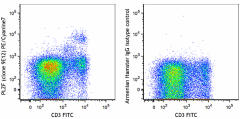
| Cat # | Size | Price | Quantity Check Availability | Save | ||
|---|---|---|---|---|---|---|
| 145805 | 25 µg | 176 CHF | ||||
| 145806 | 100 µg | 382 CHF | ||||
PLZF (promyelocytic leukemia zinc finger), also known as Zbtb16, Zinc finger and BTB domain-containing protein 16, Zfp145, is a member of the BTB-POZ family of transcription factors. It was first identified in a patient with acute promyelocytic leukemia, where a reciprocal chromosomal translocation t(11;17)(q23;q21) resulted in a fusion with RARA gene encoding retinoic acid receptor alpha. Expression of this transcriptional repressor in immune cells differs between human and mouse. In humans, PLZF is expressed in CD34+ progenitor cells and in primitive multipotent hematopoietic cell lines, NK cells, γ/δ T cells, CD4+ and CD8+ T cells. It is also expressed in MR1-specific mucosal-associated invariant T cells as well as in MHC class II-restricted T cells that develop via a thymocyte-thymocyte interaction. PLZF is involved in NK cell function, cellular quiescence, and growth suppression. It also inhibits gene expression induced by retinoic acid receptor. In mice, PLZF is highly expressed in immature CD1d-resricted invariant NKT (iNKT) cells, a subset of γ/δ (Vg1.1+Vd6.3+) T cells, and non-invariant CD1d-restricted T cells. PLZF exists as a homodimer or in complex with PLZP, and has been shown to be involved in the development of NKT cells. It is also reported to be expressed in embryonic tissues, giving rise to hematopoietic progenitors.
Product DetailsProduct Details
- Verified Reactivity
- Mouse
- Antibody Type
- Monoclonal
- Host Species
- Armenian Hamster
- Immunogen
- Combination of peptides covering the amino, carboxyl and hinge regions of the PLZF.
- Formulation
- Phosphate-buffered solution, pH 7.2, containing 0.09% sodium azide.
- Preparation
- The antibody was purified by affinity chromatography and conjugated with PE/Cyanine7 under optimal conditions.
- Concentration
- 0.2 mg/ml
- Storage & Handling
- The antibody solution should be stored undiluted between 2°C and 8°C, and protected from prolonged exposure to light. Do not freeze.
- Application
-
ICFC - Quality tested
- Recommended Usage
-
Each lot of this antibody is quality control tested by intracellular immunofluorescent staining with flow cytometric analysis. For flow cytometric staining, the suggested use of this reagent is ≤0.06 µg per million cells in 100 µl volume. It is recommended that the reagent be titrated for optimal performance for each application.
- Excitation Laser
-
Blue Laser (488 nm)
Green Laser (532 nm)/Yellow-Green Laser (561 nm)
- RRID
-
AB_2566164 (BioLegend Cat. No. 145805)
AB_2566164 (BioLegend Cat. No. 145806)
Antigen Details
- Structure
- BTB domain-containing
- Distribution
-
iNKT cells, γ/δ (Vg1.1+Vd6.3+) T cells, non-invariant CD1d-restricted T cells
- Function
- Involved in NKT cell development
- Cell Type
- Mesenchymal Stem Cells, NKT cells, T cells
- Biology Area
- Cell Biology, Immunology, Signal Transduction, Stem Cells, Transcription Factors
- Antigen References
-
1. Constantinides MG, et al. 2011. J. Immunol. 187:309.
2. Kovalovsky D, et al. 2008. Nat. Immunol. 9:1055.
3. Chen Z, et al. 1993. EMBO J. 12:1161.
4. Chen Z, et al. 1994. Proc. Natl. Acad. Sci. USA 91:1178. - Gene ID
- 235320 View all products for this Gene ID
- UniProt
- View information about PLZF on UniProt.org
Related Pages & Pathways
Pages
Related FAQs
Other Formats
View All PLZF Reagents Request Custom Conjugation| Description | Clone | Applications |
|---|---|---|
| PE anti-mouse PLZF | 9E12 | ICFC |
| PE/Cyanine7 anti-mouse PLZF | 9E12 | ICFC |
| PerCP/Cyanine5.5 anti-mouse PLZF | 9E12 | ICFC |
Customers Also Purchased
Compare Data Across All Formats
This data display is provided for general comparisons between formats.
Your actual data may vary due to variations in samples, target cells, instruments and their settings, staining conditions, and other factors.
If you need assistance with selecting the best format contact our expert technical support team.
-
PE anti-mouse PLZF
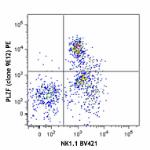
C57BL/6 mouse leukocytes from mouse liver were surface stain... 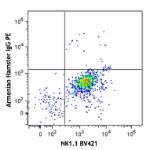
-
PE/Cyanine7 anti-mouse PLZF

BALB/c thymocytes were surface stained with CD3 FITC, then f... -
PerCP/Cyanine5.5 anti-mouse PLZF

BALB/c thymocytes were surface stained with CD3 FITC, then f...


 Login / Register
Login / Register 










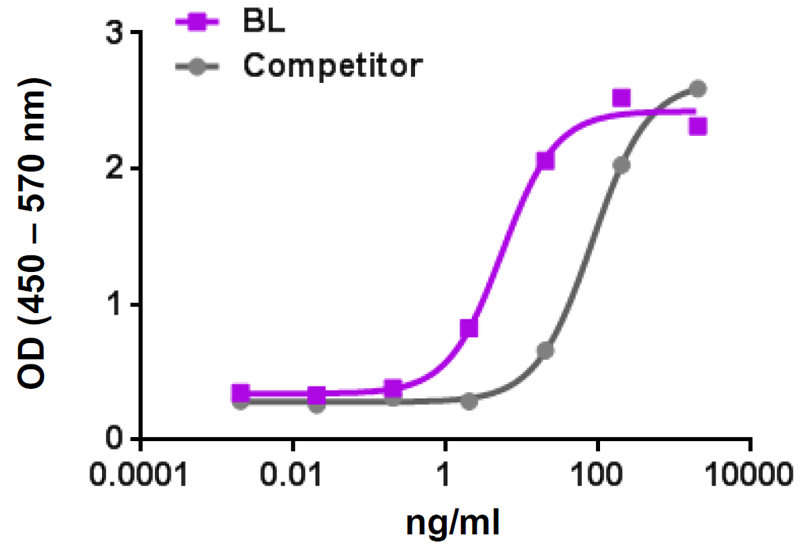
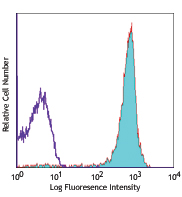
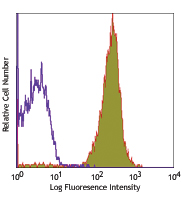
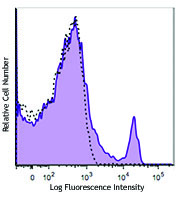






Follow Us